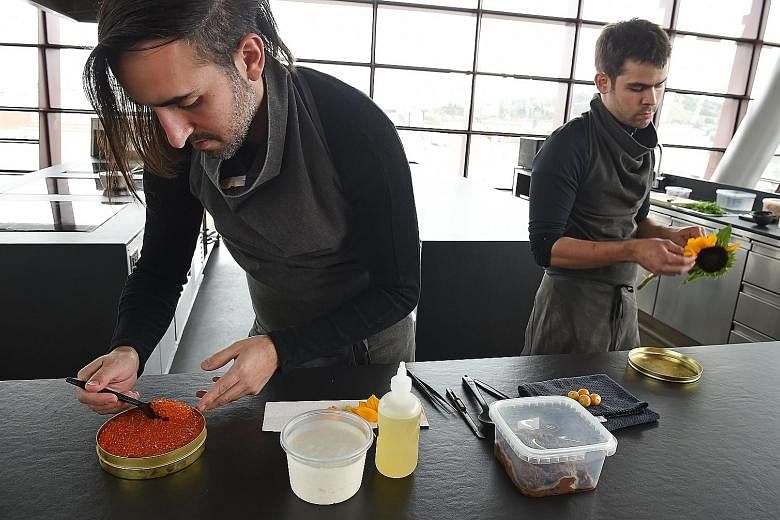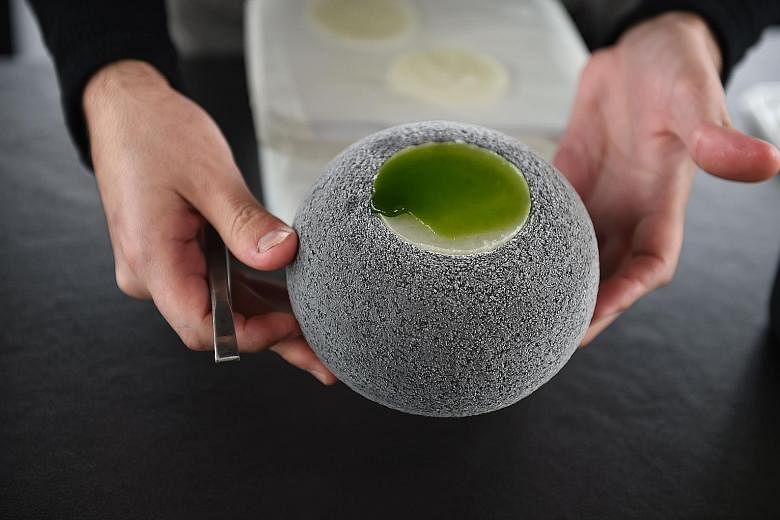LOS ANGELES • It is food for thought when chef Jordan Kahn asks: "Out of 20 courses over six months, do you remember any of the dishes that you had?
"Maybe one or two and, at the end of the day, how important was the food? The important thing was the connection that you felt and that's long-lasting."
Stepping up to the plate to dish out more than just food is what chef Kahn has done at Vespertine, which was propelled to the top of Los Angeles Times critic Jonathan Gold's prestigious annual rankings after its launch last year.
From the volcanic stone crockery and chefs' aprons woven on a loom used for samurai garments to the attentive ballet of waiters dressed in monastic black, everything has been orchestrated to stimulate much more than the taste buds.
In Los Angeles' thriving foodie scene, Vespertine has emerged as part of a new generation of restaurants in which the experience of eating is matched by an equally sumptuous feast for the other senses.
Dialogue, a tasting-menu restaurant in nearby Santa Monica, promises an experience "playing on the senses and emotions", while adventurous diners in Beverly Hills can try Somni, Catalan for "dream".
Even old hands like Austrian celebrity chef Wolfgang Puck are getting in on this high-concept, culinary high-wire act.
His The Rogue Experience - an eight-seat counter in West Hollywood where the tasting menu changes periodically - aims to "challenge expectation and push the boundaries for the future of food".
Chef Kahn was inspired to open shop when he chanced upon an odd glass building in Los Angeles with an exoskeleton of oxidised metal.
He contacted the architect to propose opening a restaurant where the objets d'art would serve as the inspiration for the cuisine.
A meal at Vespertine is a four-act drama that begins with the welcome in a half-Bauhaus, half-Japanese garden, where customers are offered a glass of champagne.
Chef Kahn greets diners in a kitchen worthy of an interior-decorating magazine. They are escorted to an open-air lounge on the top floor.
There, customers enjoy a sparkling wine aperitif.
In the dining room, guests taste 15 dishes. Chef Kahn said his work is influenced by the molecular gastronomy of Spanish chef Ferran Adria and avant-garde Chicago restaurant Alinea, where he cut his teeth.
The menu includes scallops with marrow and slices of white asparagus and a rice pudding with trout eggs and sunflower petals. Everything is washed down with biodynamic wines or kombucha cocktails.
Navigating the plate can be a game of hide-and-seek, with diners required to lift leaves or flowers to find the turbot or turkey underneath, plunging the fork blindly into bowls that are partly closed.
Vespertine prides itself on paying close attention to each diner, said chef Kahn, who encourages his waiters to notice guests' eating habits.
But while proponents lap up the eccentricity of the immersive dining scene in Los Angeles, there are also detractors, put off by what they see as a pretentious atmosphere, a tendency for over-sweet cuisine and exorbitant prices - up to US$400 (S$540) a head.
Still, chef Kahn has a point when he said people want experiences.
Beyond California, the trend is played out in Ultraviolet in Shanghai, which outdoes even the wackiest Los Angeles restaurant, with its 360-degree videos and music piped into the dining room along with aromas for the guests to appreciate.
Spain's El Celler de Can Roca, named best restaurant in the world in surveys, dazzles with its El Somni banquet, a culinary "opera" on a round table surrounded by a spherical theatre screen.
Heston Blumenthal's The Fat Duck, in southern England, offers diners Sound Of The Sea, a seafood dish served with an iPod that provides a soundtrack of crashing waves as they eat.
AGENCE FRANCE-PRESSE


